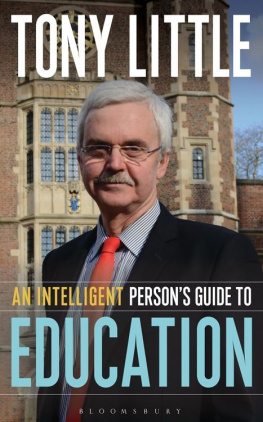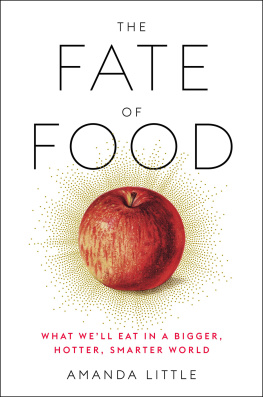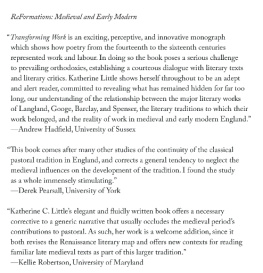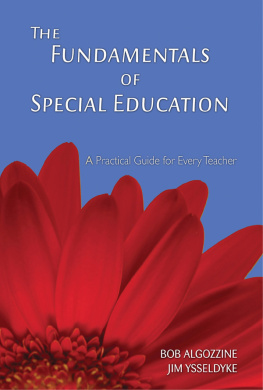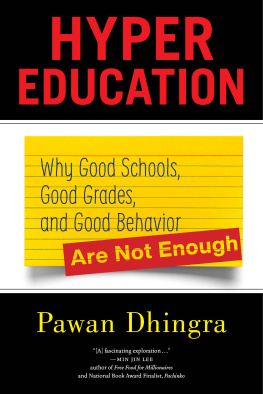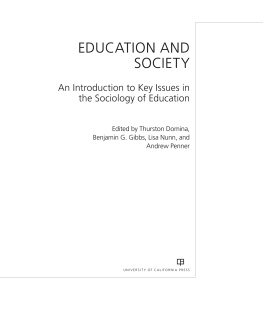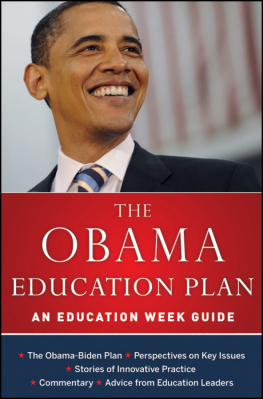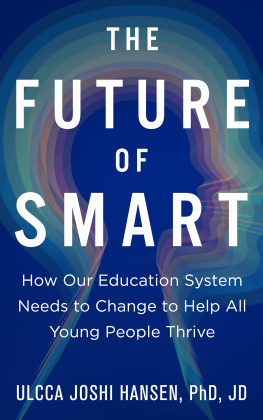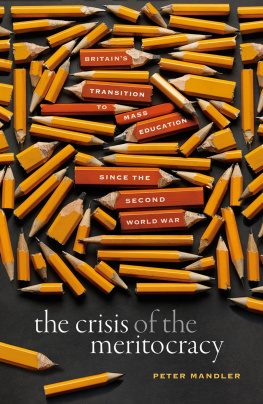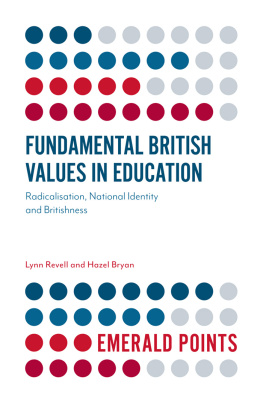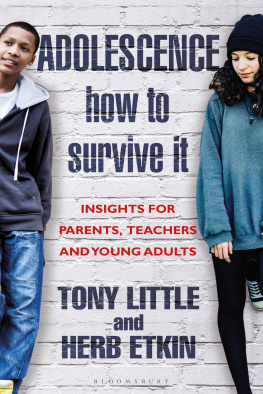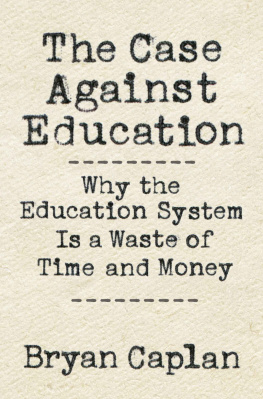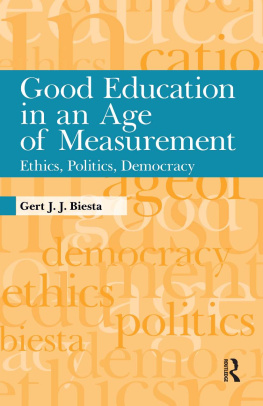AN INTELLIGENT PERSONS GUIDE TO EDUCATION
TONY LITTLE

Jenny
without whom life as a headmaster would have been impossible.
CONTENTS
Introduction
The writing of this short book was prompted by parents. Whether the motivation was earnest enquiry or politeness, over the years parents of pupils in my schools have asked me to write down ideas they have heard me talk about either in private conversation or in a public forum. As I come to the end of my time as a head, reflection seems natural.
Whether or not they pay fees, parents invest a huge amount of themselves in their childrens education. As a parent like any other, I know that a good education is the greatest gift we give our children and we want to do our best by them. Yet often parents feel at one remove, wary in a world at once familiar, yet strangely alien, like rereading a well-known story only to discover the text has changed. This book is for them.
What follows in these pages are thoughts and experiences from my life as a head. In essence, this book addresses three questions I have regularly been asked. What makes a good school? What have I learnt about teenagers along the way? What does a head actually do?
There is little reference in these pages to the great educational thinkers of our age and, I hope, even less use of jargon. This is, for the most part, homespun and personal, reflections from 26 years as a head of three rather different schools, including co-ed and single-sex, day and boarding.
Half of those years as a head have been spent at Eton College. Eton is a school which seems to exercise an unusual fascination in the public mind. Depending on your point of view, it is either a meritocratic centre of excellence or a symbol of values that should be destroyed in the pursuit of equality and social justice. I sometimes meet people who are unaware that Eton is a school with real live teenagers, who are much like teenagers everywhere.
There will be those who will say that the Head Master of Eton College has nothing worthwhile to say about education. They may well be right. Except that all teachers are part of our national conversation and should have something useful to say.
Inevitably what I think and write is strongly influenced by my experience, so teenage boys and boarding in the independent sector feature prominently in these pages, but part of the privilege of being at Eton is the passport it has given me to visit many schools at home and abroad, schools of apparently radically different style and context. Yet I have always felt at home. Whether in the East End of London or in a country prep school, whether in a tower-block in a Chinese city or a backwater village in Africa, a school is a school. There is a great deal more that brings parents and teachers together than separates.
Running as a kind of leitmotif in this book you will find references to A. C. Benson. Arthur Benson was a prolific writer, intimately connected with the worlds of literature, the church and academe in the high Victorian period. He was also a schoolmaster at Eton. In 1902 he published a short book describing and commentating upon his chosen profession. I find The Schoolmaster an extraordinary read, part window on assumptions and ideas now out of fashion, part repository of enduring wisdom. At the least, reference to his observations more than one hundred years ago serves to highlight attitudes in our own time.
The issues, problems and joys of education are universal.
What Good are Schools?
It was a hazy, heady afternoon and I was bored. I was a trainee teacher trundling through a succession of courses of variable quality and facing the prospect of a session with a less than stimulating title, something along the lines of Evaluations of school systems. The speaker was introduced. His appearance was arresting: a pale face, a penetrating eye and a wizened arm. His opening words were more arresting still: Schools are evil and you who are about to teach in schools will participate in evil.
As a young trainee teacher I was used to having to fend off barbs from friends, along the lines that teaching was a dead-end job with no prospects, suitable only for people who could not really do anything else. But to be described as the spawn of the devil was something of a new departure. Our speaker turned out to be a disciple of Ivan Illich, of whom more later, and for the first time he gave me cause to think properly about the institutions we call schools. It is a ready enough assumption to accept what is familiar, but actually, I thought, what good are these places we call schools?
There is a distinct strand in English literature which takes issue with the whole business of schooling, along the lines of Saki: Good gracious, you have to educate him first. You cant expect a boy to be vicious until he has been to a good school. This kind of approach is summed up in Osbert Sitwells memorable description of his education in Whos Who, Educ: during the holidays from Eton. It may be that writers such as these entertain some deep underlying belief that schools cause actual harm, but I doubt it; rather, these are the satirical flourishes of people who have the privilege of a good education and come from educated families. Being dismissive of something that has come easily to you is a common enough human trait.
By contrast, political and social visionaries tend to see education as the answer to everything. With the full force of Fabian rhetoric H. G. Wells said that human history becomes more and more a race between education and catastrophe. The idea that education is central to the health and development of national public life has become a distinct strand of mainstream politics, whether it is Tony Blairs raising of the banner education, education, education in 1997 as the focus for his premiership, or the heroic rhythms of Michael Gove as Secretary of State, We must be uncompromising in our vigilance, we must be unyielding in our resolve. Sweeping reform is spurred by moral imperative
It is worth peeling away the rhetoric and satire to pin down what we mean by education. At the risk of being a schoolmaster pedant, it is instructive to look at the etymological root of the word. There appears to be a choice of two familiar-sounding Latin words: educare and educere. Educere means to lead forth troops, preparing them for battle, which brings with it a resonance of drill. Educare means to nurture, to bring up, to tend and support for growth. The latter is the correct derivation but it is interesting that these two ideas have been confused over the centuries. Even today a typical dictionary definition describes education as imparting knowledge by formal instruction to a pupil. In my own mind I have an image based on the archaic English verb to educe, meaning to lead forth as a river. The idea that we learn by finding our own way as a river does down to the sea, rather than being channelled and directed, is a powerful one. This is expressed well by Muriel Spark through the words of her eponymous character Miss Jean Brodie, who criticises her colleague Miss Mackay for, putting in something that is not there and that is not what I call education, I call it intrusion.
The two descriptions of education prompted by the educare/educere debate neatly frame the central juxtaposition. Is the education we wish for our young people to be delivered through formal instruction by imparting particular knowledge and developing certain skills, or is it the nurturing of an individuals natural abilities to their limits?
Most of us would say that the education we want for our children is a balance between the two, but as we glance around the world this is not self-evident. In China, for example, a combination of culture (a Confucian belief in the teacher as sage to whom pupils must and will listen) and logistics (with, typically, 50 students in a classroom) has led to a deep-rooted belief in the power of instruction.
Next page
